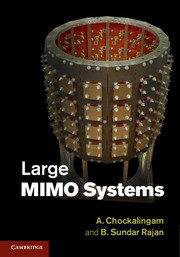Book contents
- Frontmatter
- Dedication
- Contents
- Preface
- Acknowledgments
- Abbreviations
- Notation
- 1 Introduction
- 2 Large MIMO systems
- 3 MIMO encoding
- 4 MIMO detection
- 5 Detection based on local search
- 6 Detection based on probabilistic data association (PDA)
- 7 Detection/decoding based on message passing on graphical models
- 8 Detection based on MCMC techniques
- 9 Channel estimation in large MIMO systems
- 10 Precoding in large MIMO systems
- 11 MIMO channel models
- 12 Large MIMO testbeds
- Author index
- Subject index
- References
4 - MIMO detection
Published online by Cambridge University Press: 18 December 2013
- Frontmatter
- Dedication
- Contents
- Preface
- Acknowledgments
- Abbreviations
- Notation
- 1 Introduction
- 2 Large MIMO systems
- 3 MIMO encoding
- 4 MIMO detection
- 5 Detection based on local search
- 6 Detection based on probabilistic data association (PDA)
- 7 Detection/decoding based on message passing on graphical models
- 8 Detection based on MCMC techniques
- 9 Channel estimation in large MIMO systems
- 10 Precoding in large MIMO systems
- 11 MIMO channel models
- 12 Large MIMO testbeds
- Author index
- Subject index
- References
Summary
Detection of MIMO encoded signals, be it for spatial multiplexing or space-time coding or SM, is one of the crucial receiver functions in MIMO wireless communication [1]. Compared to detection in SISO or SIMO communication in fading channels, detection in MIMO communication is more involved. This is because, in addition to fading, the receive antennas encounter spatial interference due to simultaneous transmission from multiple transmit antennas. Efficient detection of signals in the presence of this spatial interference is therefore a demanding task, and sophisticated signal processing algorithms are needed for this purpose. Consequently, design, analysis, and implementation of efficient algorithms for MIMO detection continues to attract the attention of researchers and system developers.
Often, the roots of several MIMO detection algorithms in the literature can be traced to algorithms for multiuser detection (MUD) in CDMA which have been studied since the mid-1980s [2]. This is because CDMA systems and MIMO systems are both described by a linear vector channel model with the same structural format. In the case of a CDMA system the channel matrix is defined by the normalized cross-correlations between the signature sequences of the active users, whereas the channel matrix in a MIMO system is defined by the spatial signatures between the transmit and receive antennas.
Information
- Type
- Chapter
- Information
- Large MIMO Systems , pp. 40 - 61Publisher: Cambridge University PressPrint publication year: 2014
